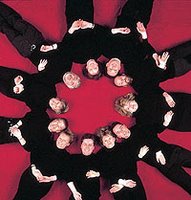

[This article originally ran in the 12.7.06 issue of
Metroland Magazine]
The fabulous Russian music download site Allof MP3.com may be soon down for the count, at least as it’s presently configured. Most of the major record companies in the world have been leaning on their plaint governments to lean on Russia to shut the site down. It appears that the Russian government’s shuttering the site has been made a quid pro quo of Russia’s joining the World Trade Organization. (Poisoning spies and subverting neighboring countries’ democracies is apparently OK, but allowing a renegade music-download website to exist? Nyet, Nyet, Vladimir!!!) Reportedly the Russians have agreed to force the site to shut down; meantime AllofMP3 claims that it follows all relevant laws, and if the laws change, it will change its practices accordingly. As of right now (Tuesday 8AM), the site is still up and running.
The demise of AllofMP3 was inevitable, really. The site has been selling songs for between 8 and 25 cents each, depending on the length of the song the nature of the file containing it. The company claims to pay proper royalties to a Russian music royalty organization that isn’t recognized by most of its counterpart organizations elsewhere in the world. It appears highly unlikely that any of the money coming in to Allof MP3 ever gets to any record labels and songwriters.
Notwithstanding the pricing and royalty issues, the site does demonstrate how a music download site ought to be run. The consumer has some choices, like what digital format the song will come in, and the quality of the file, from small standard-issue 128 bps files to large pure CD files. Consumers are charged by bandwidth, not by the number of songs ordered, so higher quality files cost more, which makes perfect sense. And songs are delivered unencumbered by DRM restrictions, so music can be moved from device to device and shared with friends, and your music won’t disappear and your computer won’t blow up. These factors, as much as the low pricing, were responsible for AllofMP3’s runaway popularity.
And whether you’re bemoaning or celebrating AllofMP3’s near-certain demise, consider this: If the records labels were paid 5 cents for every track currently being downloaded on the P2P sites for free, the labels’ gross revenues would triple. Wanna talk price points? As they say, information doesn’t want to be 99 cents.
Another cool thing about AllofMP3 is that it is about the only reliable place online to get Beatles digital tracks. All of ‘em. Beatles bootlegs, too,-- alternative takes, discarded mixes, isolated vocal tracks, studio chatter, et cetera and so on. You name it, it’s available for sale at AllofMP3 and nowhere else. You see, the Fab Two, Yoko, and whoever’s in charge of George’s stuff have refused to allow any Beatles material to be sold in any downloadable digital form by any of the “legitimate” services. AllofMP3 fills the void.
But the rumor mill is screaming that’s about to change. Last week music blogs were abuzz about the imminent release of re-mastered Beatles tracks on the internet. And the smart money was on the stuff being available on ITunes, and only on ITunes. This is profoundly weird and disturbing for a couple of reasons. First Apple Corps, the company that manages all things Beatle, and Apple Computers, Inc., the proprietor of the ITunes store, have been suing the bejesus out of each other over the use of the trademark “Apple” for, oh, about 35 years now. The other thing is the outrageously unctuous idea of having one of the most precious musical canons available only from one place, from one vendor. Sounds to me like an antitrust enforcement action waiting to happen, if anyone in government cares. We’ll see.
If this happens, one thing that will come out of it will be a custom IPod, preloaded with the entire Beatles catalog. Apple did it for U2, and you can bet your ass they’ll do it for the Beatles if they can. Those recalcitrant boomers who haven’t caught the IPod bug yet are gonna get thoroughly and irreversibly infected with the Apple flu.
Or maybe Apple will do this: put the Beatles catalog only into the new Apple IPhone. Ohhhhhhh, watch out!!! Last week, lawyers for Apple filed an application in the United States Patent and Trademark Office for a device that is both a cellphone and a music player. As there are already a multitude of cellphone / music players on the market, it’s hard to imagine exactly what new thing Apple’s going to patent, but this much is clear: the long-rumored IPhone is coming.
The cellphone market has always been remarkable unstable, with zillions of phones, a pile of manufacturers, and no clear dominant leader of the pack, no standard bearer. The closest to this was probably the Motorola Razr, but the bloom is off that rose; the Razr’s old news. Even the pink one.
Which opens up a golden opportunity for Apple to jump in, and possibly (if not probably) dominate the vast cell-phone market just like it does the digital music market. And what a more devastating way to launch the IPhone than to have it exclusively pre-loaded with the most desired, most iconic artist catalog in the history of music? I know many people, people my age who should know better, who would gladly line up outside some shopping mall store early in the evening and spend the night ignobly freezing on the tarmac, all just to get their hands on a Beatles-stuffed IPhone in the morning.
Maybe it won’t happen. This is all conjecture based on speculation borne from calculated guesses. We’ll see soon, as the wind whispers January for this stuff. Meantime it’s all making my head hurt. Beep-beep beep-beep yeah!










